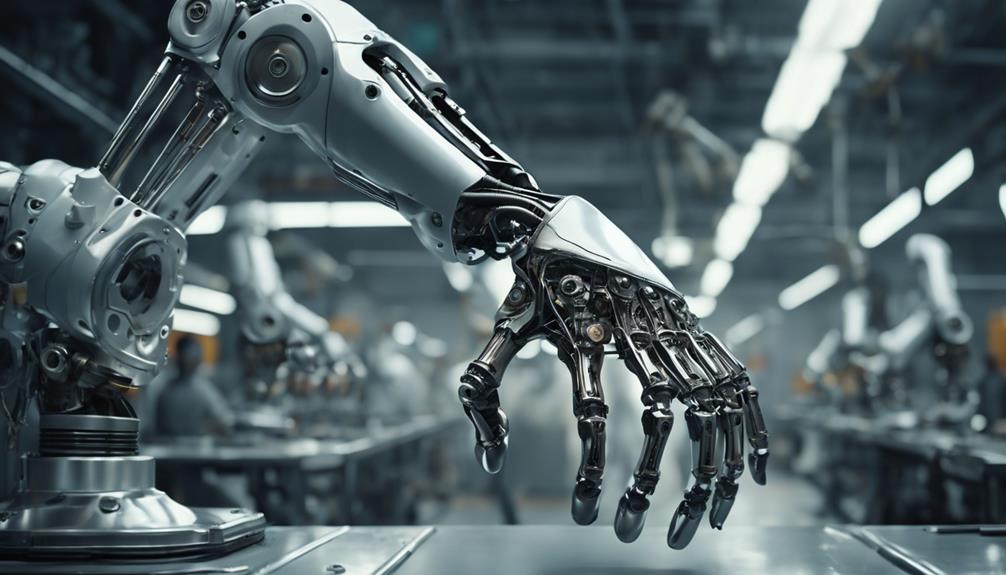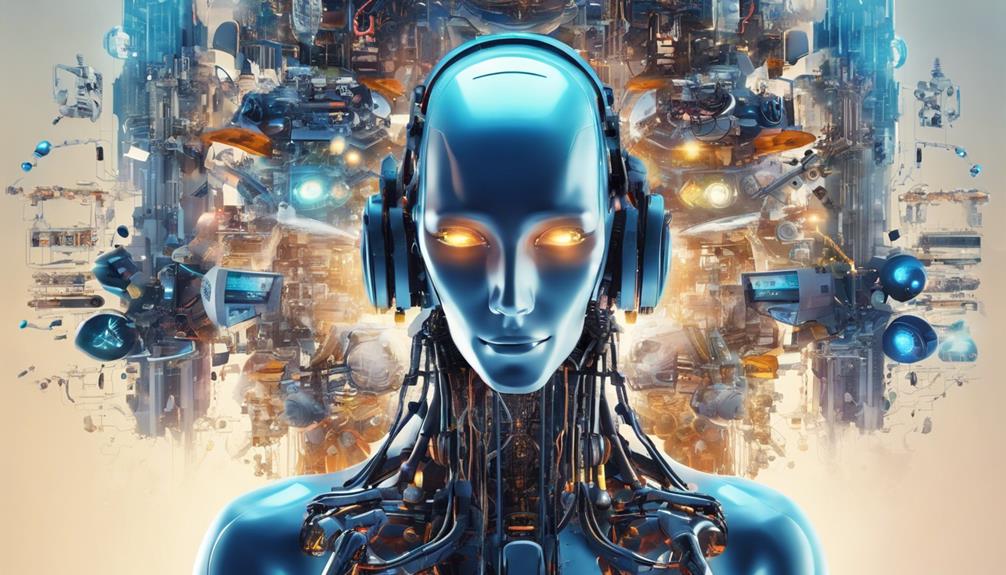As Artificial Intelligence (AI) becomes more integrated into various industries, its impact on employment is profound. The key focus is on assessing how AI affects job opportunities and discovering strategies individuals can employ to navigate this evolving landscape.
In an era where technological advancements are reshaping traditional roles, understanding the nuances of AI's influence on employment is crucial. By exploring proactive measures and adaptive approaches, individuals can position themselves strategically to thrive amidst the changing job market dynamics.
Key Takeaways
- Embrace lifelong learning to adapt to AI changes.
- Develop soft skills alongside technical expertise.
- Specialize in AI-related fields for job security.
- Combine technical proficiency with critical soft skills.
Understanding the Impact of AI on Job Roles
The transformative influence of artificial intelligence (AI) on job roles necessitates a comprehensive understanding of its implications in the rapidly evolving landscape of employment. AI tools are increasingly important in the workplace, with the potential to automate up to 25% of current job tasks, creating new tasks for workers and changing the nature of jobs.
In particular, Generative AI is at the forefront of creating new possibilities by generating content like text, images, and even code.
As AI continues to advance, workers across various industries are faced with adapting to new technologies. This technological change is reshaping job functions, especially in roles that involve data analysis and routine tasks. While there are concerns about AI impacting white-collar workers more significantly, it is essential to recognize that AI is also expected to open up new job roles and opportunities.
Understanding these shifts is crucial for individuals to navigate the changing job market successfully and leverage the potential that AI brings for innovation and growth.
Identifying Jobs at Risk of Automation

Amidst the rapid advancement of artificial intelligence (AI), certain job roles stand out as particularly vulnerable to automation. Customer service representatives, receptionists, accountants/bookkeepers, and salespeople are among the jobs at high risk of being automated by AI. Research suggests that approximately 300 million full-time jobs globally could potentially be automated by AI, impacting various industries and roles.
The exposure to AI automation is significant, with two-thirds of jobs in the U.S. and Europe facing potential automation, leading to concerns about job displacement. Educated white-collar workers earning up to $80,000 a year may also be affected, emphasizing the broad impact of AI on job roles.
McKinsey Global Institute estimates that by 2030, around 14% of employees globally may need to transition to new careers due to digitization and AI. Understanding the specific job roles most at risk of automation is crucial for individuals and organizations to develop effective strategies to mitigate the potential negative impacts of AI automation on the workforce.
Developing Essential Skills for Future Careers
Given the inevitable evolution of job roles due to the advancement of artificial intelligence (AI), cultivating essential skills for future careers has become imperative for individuals seeking to thrive in an increasingly automated workforce. Developing skills such as critical thinking, problem-solving, and creativity is crucial in preparing for the AI-impacted job market. Additionally, soft skills like communication, adaptability, and emotional intelligence are increasingly valued by employers in this era of AI. To enhance job prospects, individuals should consider familiarizing themselves with AI technologies through online courses, workshops, and hands-on experiences. Specializing in specific areas such as data analytics, cybersecurity, or digital marketing can provide a competitive edge in industries influenced by AI. Embracing lifelong learning and continuous skill development is essential for staying relevant and adaptable in a rapidly changing job market shaped by AI.
| Essential Skills | Examples | Importance |
|---|---|---|
| Soft Skills | Communication | High |
| Adaptability | High | |
| Emotional Intelligence | High | |
| Technical Skills | Data Analytics | High |
| Cybersecurity | High | |
| Digital Marketing | High |
Navigating Career Transitions in AI Era

In the evolving landscape shaped by artificial intelligence (AI), adept navigation of career transitions is paramount for individuals aiming to secure their foothold in the dynamic job market. To excel in this era of AI integration, individuals must consider the following strategies:
- Continuous Lifelong Learning: Embracing a mindset of continual learning is essential to stay relevant in a job market influenced by AI technology. Upskilling and reskilling through courses, workshops, and certifications can help individuals adapt to the changing demands of the industry.
- Development of Soft Skills: While technical proficiency is crucial, the significance of soft skills such as communication, critical thinking, and adaptability cannot be overlooked. These skills complement AI specialization and enhance one's ability to navigate career changes effectively.
- Exploration of AI Specialization Programs: Enrolling in AI specialization programs, like the one offered by Nexford University, can provide individuals with the necessary expertise to thrive in a changing job market. Specialized knowledge in AI-related fields can open up new opportunities and ensure career sustainability amidst technological advancements.
Strategies to Thrive Amidst AI Disruption
How can individuals strategically position themselves to not only survive but thrive in an era characterized by disruptive advancements in artificial intelligence (AI)? In the face of AI disruption, it is crucial for individuals to continuously engage in lifelong learning and focus on developing soft skills. By honing in-demand skills and staying updated on advanced AI technologies, individuals can enhance their job market success and adapt to the changing landscape. Specializing in specific areas, such as through programs like Nexford University's AI specialization, can provide a competitive edge in securing new jobs created by AI integration.
Embracing the integration of AI in businesses is another key strategy to thrive amidst AI disruption. This integration can drive efficiency, improve decision-making processes, and unlock valuable insights. Additionally, being agile in learning new skills and adapting to evolving human tasks is essential for navigating the impact of AI on the job market. By combining technical expertise with soft skills and a willingness to embrace change, individuals can position themselves not just to survive but to thrive in an AI-driven world.
Frequently Asked Questions
What Will Be the Impact of AI on Jobs?
AI's impact on jobs is vast, automating tasks, shifting roles, and creating new opportunities. While concerns exist about job losses, advancements also promise increased efficiency and innovation. Adapting skills and embracing AI are crucial for navigating this evolving landscape.
Which Jobs Are in Danger Due to Ai?
Jobs at risk due to AI include customer service representatives, receptionists, accountants, and salespeople. Automation threatens around 300 million full-time jobs globally, with two-thirds in the U.S. and Europe exposed. White-collar professions may also be affected, requiring career transitions by 2030.
What Jobs Will AI Replace by 2030?
AI is poised to replace roles like customer service representatives, receptionists, accountants/bookkeepers, and salespeople by 2030. This shift towards automation and digitization may lead to the displacement of educated white-collar workers and necessitate career changes.
What Jobs AI Can't Replace?
Certain jobs requiring high levels of creativity, emotional intelligence, and human interaction remain beyond AI's reach. Professions like artists, therapists, and social workers rely on uniquely human abilities that technology struggles to replicate, ensuring their continued importance in the workforce.
Conclusion
In the intricate dance of professional evolution, individuals must don the cloak of adaptability and wield the sword of continuous learning to navigate the labyrinthine corridors of AI integration.
Just as a skilled navigator charts the course through stormy seas, embracing agility and honing essential skills will serve as the compass in the tumultuous waters of automation.
Embrace the winds of change, for those who dare to sail the unknown horizons of AI disruption will emerge as captains of their destiny.









